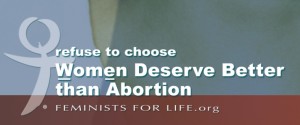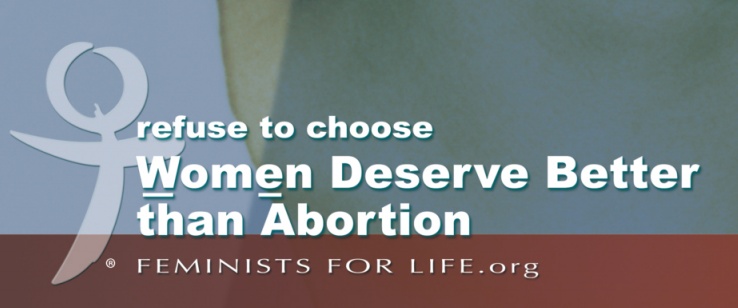Abortion advocates have, for all intents and purposes, merged with the modern feminist movement. But feminism wasn’t always about the right to kill your children. The original feminists abhorred abortion, and they fought for women to not be put in that place of desperation where they might have to choose whether or not they killed their unborn children. Feminists for Life are looking to take back feminism and to honor the true legacy of the feminist leaders of yesterday.
Cassy Fiano: Tell me about Feminists for Life.

Serrin Foster.
Serrin Foster: FFL was founded in 1970 and is a non-sectarian, non-partisan organization that seeks to address the root causes that drive women to abortion – primarily the lack of resources and support – in the tradition of Susan B. Anthony and other early feminists who opposed abortion. I came on board in 1994.
Abortion advocates claim that pro-lifers are exploiting the legacy of Susan B. Anthony, and that she would be pro-abortion if she were alive today. What is your response to that?
Well, nobody can really know how she would feel if she were alive today. All we can do is look to what she published when she was alive. First and foremost, she had a publication called The Revolution, and there was not one mention of support for abortion in it. Susan B. Anthony, Parker Pillsbury, and Elizabeth Cady Stanton were the publishers, and Pillsbury explained that Susan B. Anthony wouldn’t accept ads for thinly disguised abortifacients. She wouldn’t sell out on her principles, even when she knew the paper was going bankrupt. Every article that discussed abortion opposed it. Early feminists worked in an uneasy alliance with the male-dominated medical profession and the media to advocate legal protection from abortion. Anthony’s focus was on the root causes that drive women to abortion, as was Mattie Brinkerhoff’s and others’. My favorite quote of Susan B. Anthony’s was her response to a man who paid her a compliment by saying she “ought to have been a wife and mother.” Anthony replied, “Sweeter even than to have had the joy of caring for children of my own has it been to me to help bring about a better state of things for mothers generally, so their unborn little ones could not be willed away from them.”
And that’s what Feminists for Life wants to do: address those root causes, including threats to withhold child support. We want to make abortion unthinkable – not just illegal, but unthinkable. Abortion is a reflection that we have not met the needs of women, just like it was back in the 1800s.
No one knew that the early American feminists were pro-life until Alice Paul (the author of the original Equal Rights Amendment) told Pat Goltz (co- founder of Feminists for Life) about their anti-abortion sentiments. FFL researchers scoured historic suffrage documents and revealed the truth, which had been buried. The volume of documentation from dozens of suffragists is astonishing! The same women who fought for the rights of women to vote and the rights of slaves to be free also fought for the unborn to be born – and for support for mothers.
Why do you think that feminism has become synonymous with abortion?
Well, it starts with two men, Bernard Nathanson and Larry Later, who founded the National Association to Repeal the Abortion Laws – NARAL. Co-founder Dr. Bernard Nathanson said that after unsuccessfully lobbying state legislators, Larry Later approached the leaders of the women’s movement. He told them that if they want to be paid and hired and promoted like a man, then women should not expect employers to accommodate their pregnancies. Nathanson (who later became pro-life) also admitted that he and Larry Later went back to the drawing board and simply made up the number of women who died from abortion.
Leaders of the feminist movement didn’t look into why people died from illegal abortions – overwhelmingly it was because they were being driven to this from desperation…domestic violence, lack of resources, lack of support, fear, etc.
 But don’t think this feminist is going to blame it all on men. Sarah Weddington is equally responsible for her betrayal of women. This is perhaps what makes me most angry. In her oral arguments before the Supreme Court in Roe v. Wade, she saw the discrimination against women and the injustices. But she did not demand that these injustices be remedied; she argued that women submit to these injustices by getting the “right” to kill their own children. She rightly talks about the unmet needs of students and says there are many schools where women are forced to quit school if they get pregnant. But she didn’t argue against pregnancy discrimination or in support of alternate resources for women. It was the same with discrimination in the workplace. She clearly saw the bind for low-income women when they had an unplanned pregnancy, as with people in school, the workplace, struggling families. She frequently argued that women should be relieved of pregnancy instead of fighting against pregnancy discrimination. Weddington and the Supreme Court betrayed women and undermined support that women need and deserve.
But don’t think this feminist is going to blame it all on men. Sarah Weddington is equally responsible for her betrayal of women. This is perhaps what makes me most angry. In her oral arguments before the Supreme Court in Roe v. Wade, she saw the discrimination against women and the injustices. But she did not demand that these injustices be remedied; she argued that women submit to these injustices by getting the “right” to kill their own children. She rightly talks about the unmet needs of students and says there are many schools where women are forced to quit school if they get pregnant. But she didn’t argue against pregnancy discrimination or in support of alternate resources for women. It was the same with discrimination in the workplace. She clearly saw the bind for low-income women when they had an unplanned pregnancy, as with people in school, the workplace, struggling families. She frequently argued that women should be relieved of pregnancy instead of fighting against pregnancy discrimination. Weddington and the Supreme Court betrayed women and undermined support that women need and deserve.
Women marched in cities across the country to the rallying cry: “It’s our body! It’s our choice!” Yeah, it became our problem. Since the U.S. Supreme Court decided in favor of abortion in the twin cases Roe v. Wade and Doe v. Bolton, millions of women have laid their bodies down or swallowed a bitter pill. This forty-year experiment on women and children has been an enormous failure.
Moving forward, we need to recognize who is having abortions, and to listen to women who mourn, struggling parents, and birth mothers. There is a caricature of the single woman who’s young and facing her first pregnancy, but according to the Guttmacher Institute (formerly Planned Parenthood’s research arm), these are mothers who know it’s a baby but still seek abortions. Why? For the same reasons Weddington argued for abortion in the first place: poverty, interpersonal issues, and lack of support from family, friends, the father of the child, schools, and employers. But instead of saying we deserve better, abortion advocates and many leaders in the women’s movement have settled for less.
In today’s culture, how do we separate abortion from feminism?
I think it is swinging back towards the true feminism that embraced the basic tenets of nonviolence, nondiscrimination, and justice for all. When you look at students in particular, the pro-life movement is growing so fast. FFL has been able to equip Students for Life with our pioneering tools for schools and original research documenting the pro-life quotes by our feminist foremothers. Students listen to us because we have meaningful credentials: fighting the coercive “family cap” in welfare reform that was later proven to significantly increase abortion; FFL was the only pro-life group successfully advocating for the passage of the Violence Against Women Act; and the only feminist group to support the Unborn Victims of Violence Act – aka Laci and Conner’s Law – increased child support enforcement (important when men use financial threats to coerce pregnant women). So students who come to protest FFL events end up agreeing with 95% of our message because we answer their underlying concerns. They recognize and respect our consistently nonviolent policies and our pro-woman solutions, and this registers with people on a gut level. Even if they disagree with us on abortion, we find they are willing to work with us to end the coercive factors that drive women to abortion.
The ’70s women’s movement allowed feminism to be hijacked. FFL is leading a renaissance of the original pro-life feminist movement. Members include women who personally know the truth about abortion, and many under 40 who have never known a day without legal protection from abortion. They reject the notion that abortion is necessary for women’s rights. Furthermore, we know that in developed countries like Ireland, Poland, and Venezuela, where women have health care and are also protected from abortion, women have lower maternal mortality rates than women in America.
And thanks to the crystal-clear imaging through sonograms, everyone knows conclusively: it’s a child, not a choice. That debate is over. We’ve won the hearts and minds of most in the country on that point. Recently even Planned Parenthood admitted this when they decided to drop the term “pro-choice.” Now we have to answer the original question that was posed to pro-lifers: what about the woman?
FFL’s task list is the long list of reasons why women say they have abortions, which are well-documented by the Guttmacher Institute. The next step for the pro-life movement is to put our collective focus there. Listen to women who mourn from abortion. Listen to pregnant women and struggling parents who don’t have the support they need in school and the workplace. We can’t do everything, but we can do so much more to find meaningful solutions. Feminists for Life has published “Raising Children on a Shoestring,” a national directory of free, frugal, and creative solutions for pregnant women, expectant fathers, struggling parents – including those with special-needs babies and those seeking to adopt – and birth parents. Similarly, we want to expand support for pregnant women and parents in the workplace. So for us, we want to expand the idea of choice. I can think of many choices as opposed to abortion – marital and single parenthood, kinship care and guardianship, many adoption options. So we offer more choices than simply having “it” or not.
Maybe this is why Planned Parenthood is running from the word “choice.” People are really questioning abortion now. Is this the best we can do? Evidently not. When women feel forced to choose between sacrificing their children and sacrificing their lives and careers, we know that abortion represents failure. Who celebrates failure?
What are your thoughts on the upcoming anniversary of Roe v. Wade?
We have to clearly explain that abortion is a betrayal of feminism and focus on the unmet needs of women. We can clearly point to the Guttmacher Institute’s statistics. Nothing was solved by Roe.
Furthermore, we need to welcome people on the other side, and help them reconsider the many promises made early on by abortion advocates to women.
As pro-lifers, we have to also acknowledge our successes. There are millions of children who would never have been here without the help of loving people at local pregnancy resource centers. Half of all abortions are repeat abortions. I am convinced that the work of Rachel’s Vineyard and Project Rachel, and outreach by Georgette Forney (Silent No More Awareness Campaign) and others, has prevented millions of abortions. Most importantly, they heal the wounds inflicted on women who were betrayed by the Supreme Court, abortion advocates, and in some cases the people they counted on the most.
We have to advance the needs of women and open hearts and minds by welcoming women and men who disagree with us to work with us on shared solutions to address the problems women face.
It’s more than saying “no” to Roe and Doe. We say “yes” to life. Every child deserves his or her chance at life. Women deserve better than abortion.
To learn more about Feminists for Life, visit their website.







